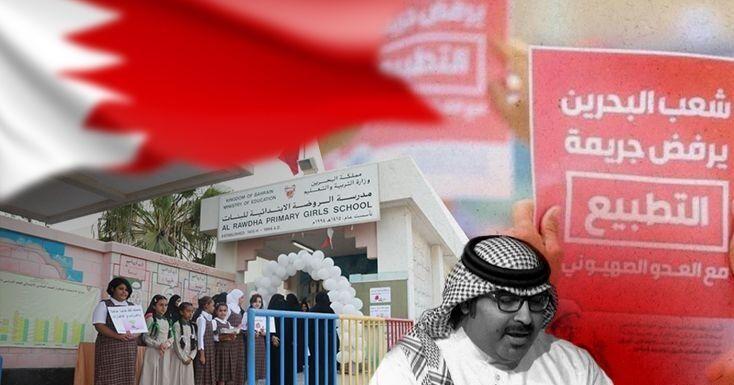Al-Khalifa’s interactive and “sincere” approach towards the Zionist regime is followed under circumstances where, due to reasons such as regional reactions, the existential crises of the Zionist regime, which has brought this regime to the brink of civil war, as well as the growing trend of developments in the field and the military in the occupied territories, the “Abraham Accords” not only remains in the same position as the days of its signing, i.e. September 2020, but on the contrary, some Arab countries, including Syria, Iraq, Oman, Yemen, etc., are facing heavy punishments as they have approved the criminalization of any normalization of foreign relations with the Zionist regime.
Just when the criminal regime of Israel is going through the most difficult period of its life since 1948, the Kingdom of Bahrain, in one of its latest treacherous efforts, is implementing a plan to make some changes in its textbooks and education on the subject of Palestine and the Zionist regime.
The Kingdom of Bahrain’s efforts to “Judaize” textbooks and educational texts have become more serious since “Mohammed Mubarak Juma” took over the responsibility of the Ministry of Education of this country two months ago, and plans are underway in this field.
Mubarak Juma is one of the elements close to the king of Bahrain who has conciliatory views towards the Zionist regime and previously, in official and unofficial statements, had shown his complete alignment with the most important approach of Manama’s foreign policy, namely reconciliation with the Zionist regime. According to Mubarak Juma, the expansion and deepening of bilateral relations with the Zionist regime should be one of the main topics of cultural, educational, social and scientific activities in this country.
Mubarak has started to implement his anti-Palestinian and compromise views in Bahrain’s education system since he became the Minister of Education of Bahrain. In the first step, he has considered punishments for teachers and employees who criticize education and refers them to the security authorities to prevent anti-Zionist statements and views. In fact, this is a prelude to aligning the educational system with the normalization project.
The Kingdom of Bahrain pursues specific goals by including Zionist teachings in its textbooks. Diverting the attention of the public opinion from the Palestinian issue and deepening and spreading the culture of reconciliation with the Zionist regime are at the top of the mentioned goals.
The Kingdom of Bahrain intends to “align” the education process in this country with the desired policies in the field of normalization and educate a generation that has less connection with the history and past of the Palestinians, as well as the culture of resistance and anti-Zionist policies. In other words, Manama seeks to “distort” the reality and narrative of the Islamic Resistance Front about the Palestinian issue.
The fact that Al-Khalifa is trying to carry out “infrastructural” measures and plant the seeds of friendship with the Zionist regime inside elementary schools and, somehow, “spread” it to the entire Bahraini society, is a “miscalculation” based on “short-term view” and definitely with consequences.
It seems that this issue will be faced with the reaction of public opinion inside Bahrain. The Abraham Accords is one of the agreements that are opposed by the majority of the people in the region, including in Saudi Arabia, the UAE, and Bahrain.
According to the results of the “Washington Foundation for American Studies” survey conducted this summer, more than 80 percent of Bahrainis are against the normalization of relations with the Zionist regime, and also 75 percent of the people of the UAE reject any normalization of relations with the Zionist regime, while more than 75 percent of the Saudi society is completely against the establishment of diplomatic relations with the usurping regime of Israel.
Although the political and security “suffocation” prevailing in some countries of the region has not yet given the people the opportunity for widespread protests against the normalization project, sooner or later the flames of this fire will appear from under the ashes and will show its consequences.
Al-Khalifa’s policies in recent years have made this country susceptible to becoming a “Second Palestine”. The establishment of the “Association of Jewish Communities in the Persian Gulf” with the aim of settling Zionists in the region with Bahrain at its heart, as well as selling the island to the Zionist occupiers, are actions whose consequences will be hard for the Kingdom of Bahrain.
The Qatar World Cup was a great and new experience that showed that the public opinion of the Arab world, unlike the compromise governments, do not have a positive view of the Zionist regime and use every opportunity to express their opposition and hostility to the Zionist occupiers.
Interactive policies with the criminal regime, whose leaders do not have much hope for its continued existence and have openly expressed it in recent weeks and months, are like “planting seeds on rocks” and lead to nothing but destroying political and diplomatic as well as economic and security assets and the credibility and fame of the Arab and Islamic image of Bahrain.
Tying the fate of the educational, cultural, social, etc. system of some Arab countries by its rulers to the fate of a regime that, according to the admission of its senior security experts, has collapsed from within and is less far from the occurrence of a civil war, cannot have a good outcome for the aforementioned governments.










0 Comments